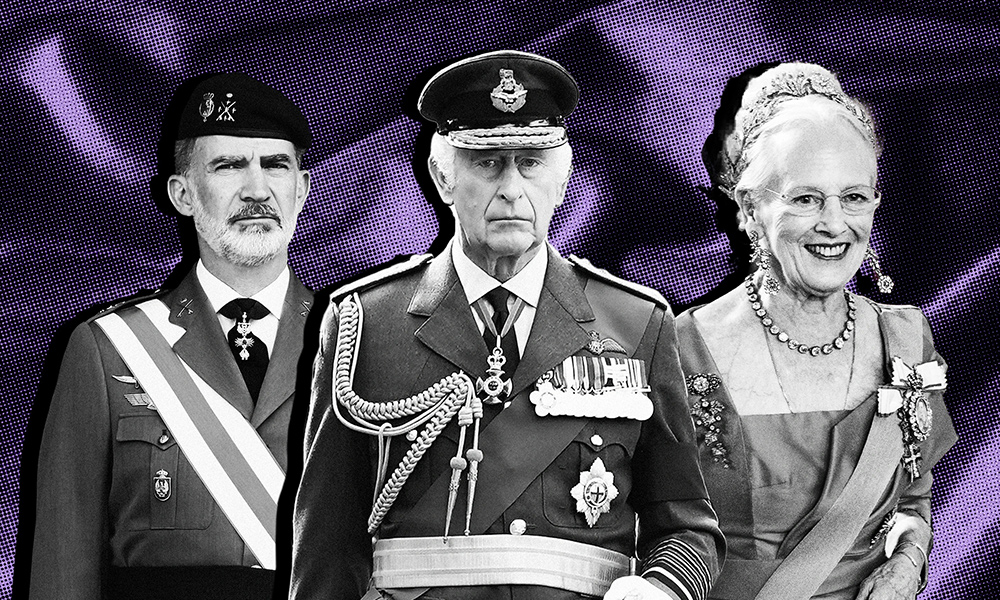欧洲王室权势日衰,一件事已迫在眉睫

过去一年是全球君主制国家发生重大转变的一年。
一个世纪以来,王室家族的权势日渐衰微,在2022年,王室衰落的速度加快,预计2023年还会进一步加速。
即使在英国,虽然其王室在2022年经历了一段美好的时光,但王室家族成员的未来看起来却不容乐观。
在经历了英国女王伊丽莎白二世的白金禧盛大庆典和她的逝世三个月后,这些壮观盛典的热度很快消退,取而代之的是有关英国王室未来的严肃对话。
数据分析公司YouGov报告称,过去十年,英国民众对王室的支持度大幅下滑。
2012年,民众希望保留王室的比例为73%,到2022年,该比例下滑到62%。在年轻一代中,支持保留王室制的比例更低;18岁至24岁的年轻人中,只有33%表示支持王室。
王室裁员
面对与日俱增的改革压力,在2022年继位的英国国王查尔斯为重要改革扫清了道路:君主制“瘦身”计划,将“王室成员”减少到11人。
该计划预计将在2023年开始执行,这意味着英国王室最终将效仿欧洲大多数国家王室的做法,包括瑞典、比利时和丹麦,努力适应现代社会。
2019年,瑞典国王取消了五位孙辈的王室头衔。2013年,比利时国王将“王子”和“公主”头衔仅限于他的直系子女和孙辈,同时修改了有权领取国家资金的王室家族成员。
丹麦女王在2022年取消了四位孙辈的王室头衔,引起了轩然大波。她表示,希望孩子们能够“打造自己的生活方式”,而不是余生被王室家族的责任所束缚。
丹麦女王玛格丽特二世的改革也将在2023年正式执行。
哪些国家在2023年将迎来王室改革?
未来,西班牙王室将引起许多人的关注,因为最近的民意调查显示,西班牙可能彻底废除王室统治。
西班牙国王胡安·卡洛斯在曝出一系列丑闻之后,于2014年退位,目前被流放到阿布扎比。他的继任者菲利普国王过去几年一直在竭尽全力恢复王室的声誉。
如果这种趋势持续下去,荷兰也可能面临类似的命运。虽然荷兰王室在2013年成功缩小规模,但却并没有避开批评的声音。在新冠疫情期间犯下的诸多严重错误,导致其受欢迎程度大幅下降。
与此同时,据《荷兰新闻》(Dutch News)报道,该国王室被共和运动Republik起诉,指控其违反了《欧洲人权公约》(European Convention on Human Rights)第6条。他们主张,荷兰国王威廉·亚历山大以非法手段影响该国的法律制度。
Republik表示,如果他们胜诉,将“废除王室享有的程序特权,并将从荷兰的法庭中彻底消除国王的符号。”
全球君主制国家日益减少
目前全球有43个国家依旧实行君主制,王室拥有不同程度的权力。其中包括英国在内的15个国家,属于英联邦国家,查尔斯国王现在是这些国家的元首,但在2022年,这种体制的未来引发了更大范围的质疑。
2021年11月,巴巴多斯切断了与英国王室的关系,并选举产生了总统。加勒比地区的其他六个国家目前也表示计划这样做,它们分别是伯利兹、巴哈马、牙买加、格林纳达、安提瓜和巴布达,以及圣基茨和尼维斯。
在另外一个英联邦国家澳大利亚,在英国女王伊丽莎白二世的全国悼念日也爆发了反王室的抗议,抗议者抨击殖民主义及其对土著人的影响。
加拿大魁北克最近结束了议员对查尔斯国王的强制性效忠宣誓,而且民意调查显示,该省79%的民众希望切断与英国王室的关系。
但在加拿大其他地区,持这种观点的受访者比例只有约54%,而加拿大总理贾斯廷·特鲁多曾经表示他并不认为短期内加拿大会切断与英国王室的关系。
除了英联邦和欧洲以外,斯威士兰和泰国反对本国君主制的抗议仍在继续。(财富中文网)
翻译:刘进龙
审校:汪皓
过去一年是全球君主制国家发生重大转变的一年。
一个世纪以来,王室家族的权势日渐衰微,在2022年,王室衰落的速度加快,预计2023年还会进一步加速。
即使在英国,虽然其王室在2022年经历了一段美好的时光,但王室家族成员的未来看起来却不容乐观。
在经历了英国女王伊丽莎白二世的白金禧盛大庆典和她的逝世三个月后,这些壮观盛典的热度很快消退,取而代之的是有关英国王室未来的严肃对话。
数据分析公司YouGov报告称,过去十年,英国民众对王室的支持度大幅下滑。
2012年,民众希望保留王室的比例为73%,到2022年,该比例下滑到62%。在年轻一代中,支持保留王室制的比例更低;18岁至24岁的年轻人中,只有33%表示支持王室。
王室裁员
面对与日俱增的改革压力,在2022年继位的英国国王查尔斯为重要改革扫清了道路:君主制“瘦身”计划,将“王室成员”减少到11人。
该计划预计将在2023年开始执行,这意味着英国王室最终将效仿欧洲大多数国家王室的做法,包括瑞典、比利时和丹麦,努力适应现代社会。
2019年,瑞典国王取消了五位孙辈的王室头衔。2013年,比利时国王将“王子”和“公主”头衔仅限于他的直系子女和孙辈,同时修改了有权领取国家资金的王室家族成员。
丹麦女王在2022年取消了四位孙辈的王室头衔,引起了轩然大波。她表示,希望孩子们能够“打造自己的生活方式”,而不是余生被王室家族的责任所束缚。
丹麦女王玛格丽特二世的改革也将在2023年正式执行。
哪些国家在2023年将迎来王室改革?
未来,西班牙王室将引起许多人的关注,因为最近的民意调查显示,西班牙可能彻底废除王室统治。
西班牙国王胡安·卡洛斯在曝出一系列丑闻之后,于2014年退位,目前被流放到阿布扎比。他的继任者菲利普国王过去几年一直在竭尽全力恢复王室的声誉。
如果这种趋势持续下去,荷兰也可能面临类似的命运。虽然荷兰王室在2013年成功缩小规模,但却并没有避开批评的声音。在新冠疫情期间犯下的诸多严重错误,导致其受欢迎程度大幅下降。
与此同时,据《荷兰新闻》(Dutch News)报道,该国王室被共和运动Republik起诉,指控其违反了《欧洲人权公约》(European Convention on Human Rights)第6条。他们主张,荷兰国王威廉·亚历山大以非法手段影响该国的法律制度。
Republik表示,如果他们胜诉,将“废除王室享有的程序特权,并将从荷兰的法庭中彻底消除国王的符号。”
全球君主制国家日益减少
目前全球有43个国家依旧实行君主制,王室拥有不同程度的权力。其中包括英国在内的15个国家,属于英联邦国家,查尔斯国王现在是这些国家的元首,但在2022年,这种体制的未来引发了更大范围的质疑。
2021年11月,巴巴多斯切断了与英国王室的关系,并选举产生了总统。加勒比地区的其他六个国家目前也表示计划这样做,它们分别是伯利兹、巴哈马、牙买加、格林纳达、安提瓜和巴布达,以及圣基茨和尼维斯。
在另外一个英联邦国家澳大利亚,在英国女王伊丽莎白二世的全国悼念日也爆发了反王室的抗议,抗议者抨击殖民主义及其对土著人的影响。
加拿大魁北克最近结束了议员对查尔斯国王的强制性效忠宣誓,而且民意调查显示,该省79%的民众希望切断与英国王室的关系。
但在加拿大其他地区,持这种观点的受访者比例只有约54%,而加拿大总理贾斯廷·特鲁多曾经表示他并不认为短期内加拿大会切断与英国王室的关系。
除了英联邦和欧洲以外,斯威士兰和泰国反对本国君主制的抗议仍在继续。(财富中文网)
翻译:刘进龙
审校:汪皓
This past year has marked a big shift for monarchies on a global scale.
While the power held by royal families has been on the wane for a century, the decline picked up speed in 2022 — and is expected to accelerate further in 2023.
Even in the U.K., which experienced a love-in with its monarchy in 2022, the future for members of the royal family does not look bright.
After the vast celebrations around Queen Elizabeth II’s Platinum Jubilee and her death three months later, pageantry quickly gave way to serious conversations about the British monarchy’s future.
Data analytics firm YouGov reported that public support for the monarchy in the U.K. has declined significantly in the last decade.
In 2012, 73% wanted to keep it, while in 2022 that figure dropped to 62%. That number proved to be even lower among younger generations; among 18-24 year-olds, just 33% said they supported the monarchy.
Royal layoffs
Under increasing pressure to reform, the recently ascended King Charles cleared the path for significant change: a projected “slimming down” of the monarchy — reducing the number of “working royals” down to 11.
The plan is set to come into place in 2023, and it will mean that Britain’s royals will finally be following much of Europe in adapting to the modern world, including Sweden, Belgium, and Denmark.
In 2019, the King of Sweden stripped five of his grandchildren of their royal titles, while in 2013, the King of Belgium limited the titles of “Prince” and “Princess” to only his direct children and grandchildren, while also amending which members of the royal family could receive state funds.
The Queen of Denmark caused a stir in 2022 when she stripped four of her grandchildren of their royal titles, arguing she wanted them to be able to “shape their own existence,” instead of living the rest of their lives bound by royal duties.
Queen Margrethe II’s changes will also officially come into place in 2023.
Which countries could see royal reform in 2023?
Looking forward, plenty of eyes are on the Spanish monarchy, as recent polls suggest the country could be heading toward the abolition of royal rule altogether.
King Juan Carlos abdicated in 2014 following a number of scandals and is now exiled in Abu Dhabi. His successor, King Filipe has spent the last few years desperately trying to revive the royal family’s reputation.
The Netherlands could face a similar fate, if trends continue. Although the Dutch monarchy successfully downsized in 2013, they haven’t escaped criticism. Several blunders during the pandemic sent their popularity plummeting.
Meanwhile, according to Dutch News, the monarchy is being sued by the republican movement Republik, for breaching article 6 of the European Convention on Human Rights. They argue that King Willem Alexander has illegal influence over the country’s legal system.
If successful, Republik say it could result in “abolishing the procedural privileges of the monarchy, and eradicating all symbols of the king from Dutch courtrooms.”
Globally, monarchies are in decline
There are currently 43 countries in the world that still have a monarch, with varying levels of power. Fifteen of those countries, including the U.K., exist within the British commonwealth, with King Charles now as their head of state, but the future of that came into question on a larger scale in 2022.
In November 2021, Barbados severed ties with the British monarchy and installed a president. Six other Caribbean nations have also now indicated they plan to do the same: Belize, the Bahamas, Jamaica, Grenada, Antigua and Barbuda, and St. Kitts and Nevis.
In Australia, another commonwealth nation, anti-monarchy protests erupted on what was supposed to be the country’s day of mourning for Queen Elizabeth II, with those involved decrying colonization and the effects it had on the Aboriginal population.
In Canada, Quebec recently ended its mandatory oath of allegiance to King Charles for legislators, and polls show that 79% of the province wishes to sever ties with the British monarchy.
In the rest of Canada, however, only around 54% of respondents say they want that, while Prime Minister Justin Trudeau has said he does not see a severing of ties anytime soon.
Beyond the British Commonwealth and Europe, protests have continued in Eswatini and in Thailand against their own monarchical systems.













